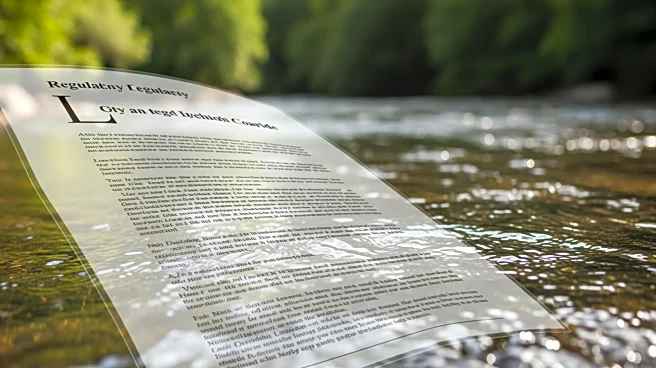What's Happening?
The Trump administration has unveiled a new rule aimed at reducing the scope of federally protected wetlands in the United States. This proposal, part of a long-standing policy debate, seeks to redefine which waterways fall under federal oversight. The Environmental
Protection Agency (EPA) plans to focus on permanent bodies of water such as streams, rivers, and lakes, while limiting the broader definitions of wetlands previously embraced by the Obama and Biden administrations. The EPA claims this change will cut red tape and provide clarity to farmers, ranchers, and developers. The proposal has received support from business groups like the National Association of Manufacturers, which argue that previous definitions created legal uncertainty. However, environmental groups have expressed concern, warning that the changes could lead to increased water pollution and the loss of critical wetlands.
Why It's Important?
The proposed rule has significant implications for U.S. environmental policy and economic stakeholders. By narrowing the definition of protected waterways, the Trump administration aims to reduce regulatory burdens on industries such as agriculture and construction, potentially boosting economic growth. However, environmentalists warn that this could undermine efforts to protect water quality and preserve natural habitats. The rule could lead to more localized decision-making, with states and local governments taking on greater responsibility for waterway protection. This shift may result in varied levels of environmental oversight across the country, depending on state policies. The proposal reflects ongoing tensions between economic interests and environmental conservation, highlighting the challenges of balancing development with ecological preservation.
What's Next?
The proposed changes are open for public comment for 45 days, allowing stakeholders to express their views and potentially influence the final rule. The Trump administration's approach aligns with a recent Supreme Court decision that limits the EPA's authority to define its jurisdiction over waterways. As the debate continues, environmental groups are likely to challenge the proposal, arguing for broader federal protections. The outcome of this policy shift could have long-term effects on U.S. water management and environmental regulation, with potential legal battles and legislative actions shaping the future of waterway protections.
Beyond the Headlines
The proposal raises ethical and legal questions about the federal government's role in environmental protection. Critics argue that reducing federal oversight could lead to the degradation of vital ecosystems and compromise public health. The rule also reflects broader political dynamics, as administrations grapple with differing priorities regarding environmental regulation. The decision to limit protections may signal a shift towards prioritizing economic growth over ecological sustainability, with potential consequences for climate change mitigation efforts.















